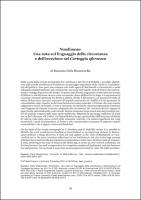Chapter Nondimeno. Una nota sul linguaggio dell’eccezione e della circostanza nel Carteggio sforzesco
Author(s)
DELLA MISERICORDIA, MASSIMO GIUSEPPE
Language
ItalianAbstract
On the basis of the recent monograph by C. Ginzburg and G. Pedullà’s review, it is possible to identify the word nondimanco/nondimeno (nonetheless) as an important element in Renaissance political writing. However, it does not only appear in the work of Machiavelli or Guicciardini and in the more conscious reflections by the intellectuals, but also in the huge amount of letters that constitute the government correspondence of the time. In these kinds of pragmatic texts, referring to the state of Milan in the Sforza age, it recurs as a key word of a dilemma: the friction between law and transgression (or exception considered legitimate) and also between law and practice. On one hand, it expresses an assumption invested in value: the duke must honor his promises and the contents of the chapters agreed on with his subjects; custom demands respect; factional divisions must be overcome. At the same time it reveals the concern that this principle could be trampled upon, or instead the will, if not the need, to attenuate the more general rule. This conjunction thus summarized the requirement to nuance the law, to adapt it to circumstance, and to conciliate potentially conflicting rights or reasons. In short, it stands as an indicator of one of the main causes of open tensions in the late medieval state, debated by a long tradition of scholars ranging from O. Brunner to R. Fubini: the opposition between the authority of the prince, as arbiter of the exception requested from time to time from the same variety of concrete situations, and the legalistic culture of the territorial bodies, which, referring to law and custom, tempted to stem the “extraordinary” powers that the duke was attributing to himself.


 Download
Download Web Shop
Web Shop